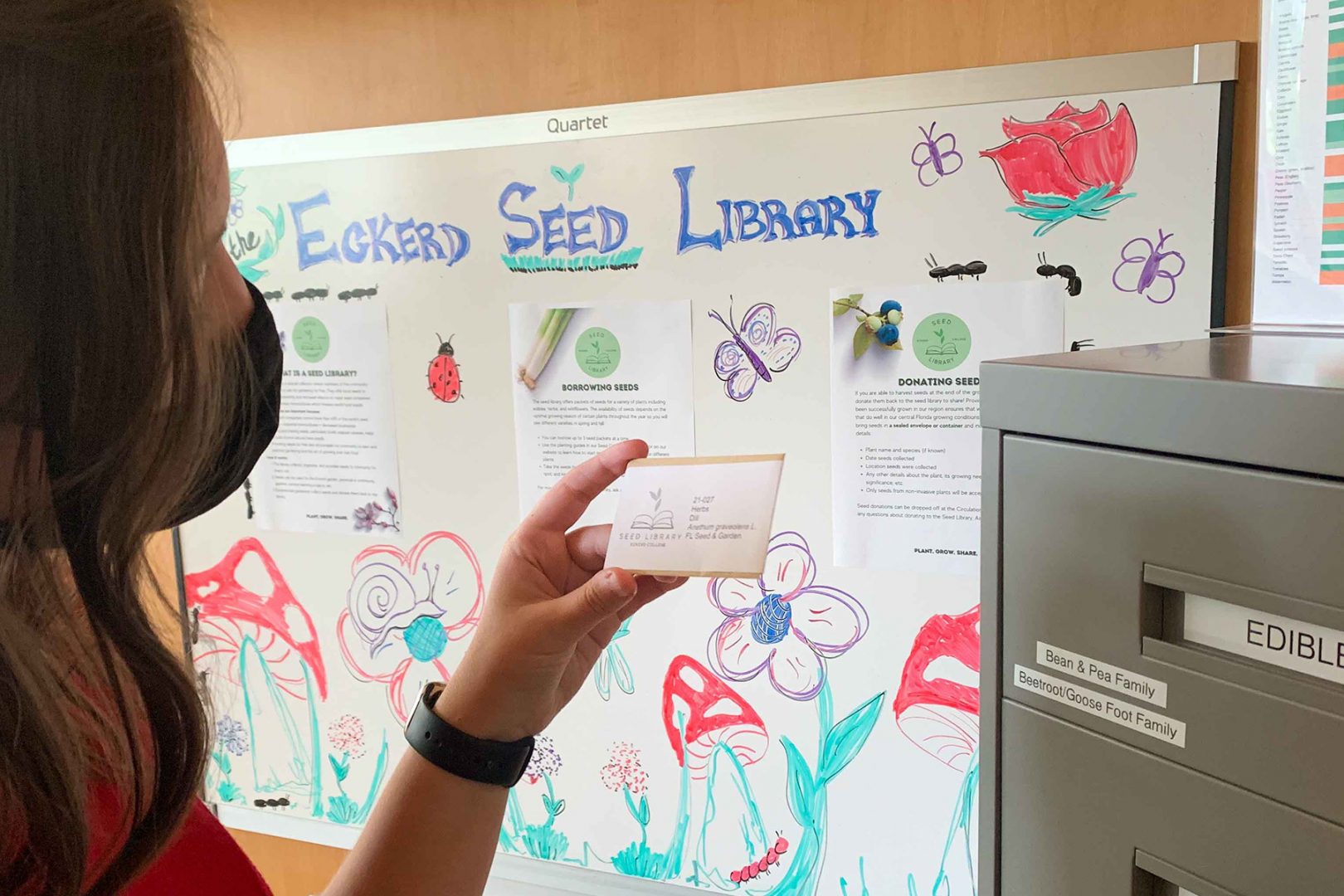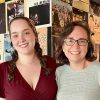Tritons and friends hoping to green their thumbs—and the planet—just got a new on-campus resource.
The Eckerd College Library opened its very own Seed Library on April 12 with a collection of more than 600 packets of 50 varieties of Florida-friendly wildflowers, herbs and edibles to share with budding gardeners across the community, said Nancy Schuler, librarian and assistant professor of electronic resources, collection development and instructional services. The project was funded with a $500 Intergenerational Learning grant from the Academy of Senior Professionals at Eckerd College.
“We did an inventory and we’ve already circulated about 200 packets,” said Schuler. “It’s great to see that the community is interested in grabbing seeds, sharing them and possibly growing them into something they might eat.”
Similar to local seed libraries in Dunedin and Childs Park, Eckerd’s Seed Library collected its samples by purchasing seeds from local and regional seed companies as well as accepting donations. People can take up to three packets of seeds per week, and if they are successful in growing their plants or harvesting an edible, they are encouraged to collect the seeds and donate them to the library for further distribution of locally produced seeds. These exchanges promote biodiversity in our ecosystem. More than 60% of seeds in the world come from four major companies, which creates plant monocultures, according to the Seed Library website.
The idea for Eckerd’s collection began with a final project for Visiting Assistant Professor of Theatre Antonia Krueger’s Animals and Performance class last fall. Schuler helped the class source and acquire seeds to plant a butterfly garden that became an art installation without audio and visual components.
Schuler was encouraged by the experience and the enthusiasm of the students to think more broadly about how a repository of seeds could be useful to campus. Outside of maintaining the campus butterfly gardens and contributing to the planned Eckerd College Farm, seeds could be of use to faculty in their curricula and students for their stress relief.
“I do not have a green thumb, but I started a COVID garden for my children to learn from and be able to see butterflies in their different stages,” Schuler said. “Now I enjoy it more than they do. Being out there and observing, and the sense of accomplishment, has been really rewarding.”
Reference librarians consulted with faculty advisers Assistant Professor of Environmental Studies Hilary Flower, Assistant Professor of Biology Jeff Goessling, Environmental Studies Instructor and Internship Coordinator Dave Himmelfarb, and Krueger to make sure the first collection reflected noninvasive species that would grow well in the summer months under Florida’s extremely hot and wet weather conditions. Butterfly milkweed (Asclepias tuberosa) wildflowers have been the most popular pick since the grand opening.
Experienced gardeners and ambitious amateurs joined the Triton Melon Challenge, where seeds of the hybrid melon were developed by Earthworks Seeds in collaboration with Associate Professor of Biology Liza Conrad and her student researchers. Participants will compare final melon weights and vine lengths, and offer growing tips for future growers.
Student workers created the Seed Library website and marketing plan, and they stuffed seed packets to establish the physical collection, Schuler said. On Earth Day (April 22), students are invited to head to the South Beach Pavilion, grab a pot and some paint during the Seeds at Sunset event, and decorate the home for their newly acquired packet of seeds.
Keeping a seed library sustainable relies on finding a community of seed savers—gardeners who store seeds for the next planting season—to continually donate a part of their harvest. Interested donors may inquire at seedlibrary@eckerd.edu about sharing their bounty with the Eckerd community.
“What is really nice about the gardening community is how open it is and people are willing to help and share tips,” Schuler said. “It’s something you learn more from every year. And it benefits us as a society to know where our food comes from.”













